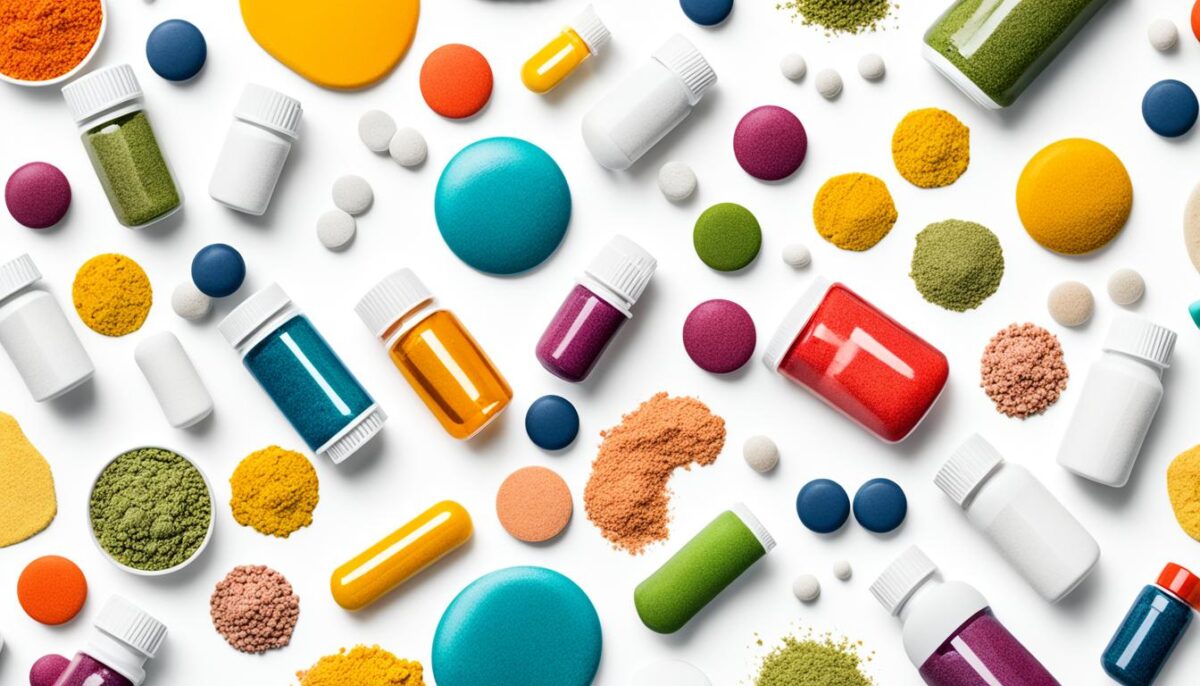Tired of buying workout supplements that don’t work like they promised? It’s hard to pick the right one in the huge world of fitness supplements. But, remember, a balanced diet is key. Even the best supplements can’t fill a gap in your diet.1 There is some good news, though. Many supplements are tested and proven to help with different fitness goals.
Key Takeaways
- Fitness supplements are more frequently contaminated with illicit substances than other products.1
- The FDA does not review dietary supplement products for safety or effectiveness.1
- Creatine is proven to be effective, with a recommended daily dose around 5 grams.1
- Whey protein is effective for muscle recovery and building muscle, with a minimum of 20 grams post-workout.1
- Plant-based protein powders may contain higher levels of heavy metals, such as lead.1
Understanding the Supplement Industry
The fitness supplement world is vast and can seem overwhelming. It’s important to remember that nothing beats a balanced diet.2 Yet, some supplements are tested and known to help with your fitness journey.
Determining the Quality of Supplements
First, look for supplements that are tested for safety and label accuracy.2 A good company will share their test results. This is key because supplements can sometimes have hidden, harmful stuff. The FDA can’t check all of them.3
Importance of Third-Party Testing
Since the FDA doesn’t check supplements like they do drugs, third-party testing is crucial.2 An NSF certification means the product was tested carefully for bad stuff. It also means the label is honest about what’s inside.2
FDA Regulations on Supplements
The FDA doesn’t look at supplements the same way it does with drugs.2 This lets supplement makers say their products do a lot without proving it. It’s up to us to be careful and do our own homework on supplement safety and quality.3
Whey Protein for Muscle Growth and Recovery
Protein is essential for everyone’s muscles to recover and grow.4 After working out, experts say you should have at least 20 grams of protein to help your muscles heal and get bigger. Using protein powder is easy, but eating whole proteins is the best.4 Still, if you do go for protein powder, choose one made from whey and from animals that are raised well.
Benefits of Whey Protein
Many people in the fitness world like whey protein because it helps so much.4 It has been proven to aid in muscle recovery. Plus, when protein and leucine are eaten with carbs after a workout, it helps build muscle in men.4 Also, taking whey protein and doing tough workouts has led to more muscle and strength.4 Drinking fat-free milk after lifting weights has shown better results for muscle gain over soy or just carbs for guys who are new to lifting.4
Choosing the Right Whey Protein Powder
Choosing the right whey protein powder means finding one without extra sugars, fillers, or preservatives, but with lots of protein and key amino acids.4 There’s a caution, though. Plant protein powders sometimes have more harmful metals like lead than whey.4 If you’re looking for good whey proteins, Thorne Whey Protein Isolate is one choice. It has 21 grams of protein, 100 calories, and only 1 gram of sugar.5 Another good one is Xwerks GROW whey protein isolate, with 25 grams of protein and 2.5 grams of leucine. It’s well-liked for its taste and consistency.5
Creatine Monohydrate: A Proven Performance Enhancer
Creatine stands out among other supplements for its proven success.6 It boosts strength, power, and muscle growth. Extensive research shows it’s safe, with no known long-term harm.6
How Creatine Works
Creatine mainly comes from meat in our diet.6 This means vegetarians might have lower levels. Taking creatine monohydrate has been shown to boost exercise performance and add muscle.6 Supplementing with creatine increases the body’s creatine store.6
Dosage and Side Effects
The recommended daily dose of creatine monohydrate is 3 to 5 grams.6 Users might see a bit of weight gain from water retention.6 Drinking plenty of water can reduce common side effects like stomach upset, muscle cramps, and heat sensitivity.6
Start with a loading phase of 25 grams daily, then drop to 5 grams for maintenance.6 Doing this alongside training can enhance strength.6 Studies show that it helps boost strength and endurance over placebos by 8% to 14%.6
Creatine, combined with weightlifting, enhances strength and muscle size.6 It improves the body’s nerve and muscle signaling, making short bursts of hard exercise better.6 Overall, it can increase high-intensity exercise performance by 7.5%.6
Studies by Kreider et al. (2017) point out the value of creatine in exercise and sports.7 Del Favero et al. (2011) found that creatine, not betaine, boosted muscle energy and strength.7
A review by Lanhers et al. (2015) showed creatine helped with leg strength.7 Short-term use also improved speed and leg strength in female futsal players.7 An experiment by Zuniga et al. (2012) found it boosted quick and powerful movements.7
Antonio and Ciccone (2013) compared taking creatine before or after workouts for gains.7 Pearson et al. (1999) studied creatine’s longer effects on athlete performance.7
Caffeine: A Natural Energy Booster
Caffeine naturally occurs in coffee, tea, and certain supplements. It gives a strong kick of energy.8 For most healthy people, a good dose before working out is 200 milligrams. The max in a day should not be more than 400 milligrams. Using black coffee is safest. It gives health benefits and avoids the risk of taking too much.8
Studies show that offers many pluses for working out. It helps burn more energy, makes the body use fat better, and keeps you sharp.9 The U.S. has seen more people enjoy it over time, with habits changing and more forms being available.10
Yet, remember that everyone’s body is different. Be on the lookout for how your body reacts to caffeine. It’s always smart to talk to a doctor before adding it to your fitness plans.10
L-Citrulline: Enhancing Blood Flow and Muscle Building
L-citrulline is a nonessential amino acid known for boosting blood flow and aiding muscle growth.11 It increases blood flow and protein use, which help in muscle growth and repair.11 What’s more, it turns into nitric oxide, which widens blood vessels and lowers high blood pressure.11
Benefits of L-Citrulline
Besides enhancing blood flow, L-citrulline also boosts performance and muscle growth.11 A study by Gough et al. in 2021 showed it helped with certain exercises for women.11 Another by Wax et al. in 2016 found it improved exercise and heart activity in men.11
Recommended Dosage
The ideal L-citrulline dose before workouts is up to 10 grams.11 This amount offers better exercise, muscle building, and heart health.11 But bear in mind, results may vary. For instance, some studies didn’t see benefits for everyone.11 Chappell et al’s work in 2018 noted no effect on certain exercises or muscle pain for moderately trained people with Citrulline Malate.11
Always talk to your doctor before starting L-citrulline.11 This is crucial if you’re on medication or have health issues. Knowing both the pros and cons can help you wisely use this supplement for better fitness and health.
Beta-Alanine for Endurance and Muscle Fatigue
Beta-alanine is an amino acid the body can make.12 It might help athletes last longer in intense exercises.12 Yet, it doesn’t boost muscle strength or how long muscles can work.12 To really see benefits, it might take weeks of beta-alanine use.12
How Beta-Alanine Works
Carnosine is key because it delays muscle fatigue. 112 Less lactic acid builds up this way.12 Studies in 2006 and 2007 found oral beta-alanine helps make more muscle carnosine.13 This led to better high-intensity exercise performance.13 Further work in 2009 confirmed this.13
Ideal Dosage for Maximum Results
The best beta-alanine dose is 4 to 6 grams a day, says a key source.12 Getting beta-alanine from food helps too, but taking extra can boost muscle endurance.12 Stegen and team showed us the right dose to up carnosine in muscles and keep it up.13
Some folks feel skin tingling with large beta-alanine doses.12 But, studies say it aids endurance, even for seniors.12 Heart and ED meds could mix badly with beta-alanine. Plus, it’s unclear if it’s safe for kids, some health issues, or pregnant/nursing women.12 The U.S. FDA treats it like food, not medicine.12
Nitric Oxide Boosters for Improved Pumps
Nitric oxide is vital for better blood flow in the body.14 It widens blood vessels, letting more oxygen and nutrients reach muscles. This improves how well you exercise and build muscle. L-citrulline and other supplements boost nitric oxide, giving users a good “pump” during workouts. This is loved by people who work out.
Understanding Nitric Oxide
Nitric oxide makes blood vessels dilate, improving blood flow.14 This benefits exercise and muscle growth by sending more oxygen and nutrients to muscles. It aids muscle repair and helps with muscle growth.
Popular Nitric Oxide Supplements
L-citrulline is a top supplement to boost nitric oxide.14 Studies show it helps build muscle and perform better. For the best effects, take up to 10 grams of L-citrulline before your workout. The mix of watermelon and citrulline also boosts blood vessel health and exercise performance. This supports its use in improving workouts and fitness goals.
Nitric oxide supplements can help with exercise and muscle growth, but their benefits vary.15 They might help less trained people more than those who are well-trained. They could cause stomach issues, dizziness, and headaches. Always talk to a doctor before trying nitric oxide boosters.
Pre-workout Supplements for Energy and Focus
Pre-workout supplements boost your exercise with extra energy and focus. They usually mix caffeine, beta-alanine, and citrulline. This blend helps you perform better when exercising.16
Key Ingredients in Pre-Workouts
One study shows pre-workout mixes have caffeine, citrulline, and more. These help kick up your energy, sharpen your focus, and boost staying power. It’s great for your workouts.16
Popular Pre-Workout Supplement Brands
Experts say big names in pre-workouts are Transparent Labs, Optimum Nutrition, and All Black Everything. Each brand offers its own mix, including citrulline malate, beta-alanine, and caffeine.17
Even though pre-workouts can up your game, be careful.16 Some are packed with caffeine, which might not be good if you have too much.16 And the “proprietary blends” thing? It means you can’t tell exactly what’s in them.16 Always talk to a doctor and look for third-party checks to be sure any pre-workout is right for you.16
Post-Workout Recovery Supplements
For athletes and fitness fans, boosting recovery after training is key. It helps your muscles heal, get stronger, and perform better. Important supplements for this are branched-chain amino acids (BCAAs) and protein powder.
BCAAs for Muscle Recovery
BCAAs are key in helping muscle tissue repair and grow, especially for older adults.18 Experts say taking up to 20 grams of BCAAs daily is safe and helps recovery after lifting weights.18
Protein Powder for Muscle Repair
After your workout, your body needs at least 20 grams of protein to rebuild muscle.18 Protein powders are easy to use, but it’s best to get most of your protein from real food. Supplements are good to use when you can’t eat enough protein from meals.18
Whey protein isolates are great for quick recovery. They’re a fast-absorbing protein, with over 90% being protein.19 They have all the needed amino acids for muscle growth and repair.19
MuscleTech’s post-workout supplements are backed by science. They aim to help recover faster and lessen muscle pain after tough workouts.20 Designed for both men and women, they meet the needs of their different fitness and health goals.20
workout supplements: Optimizing Your Fitness Journey
Starting your fitness journey means knowing how workout supplements help. Think of them as an extra boost alongside your balanced diet. They can make up for any nutrient deficiencies and help you meet your fitness goals.21
Combining Supplements with a Balanced Diet
Supplements should not replace what you eat but enhance it. A balanced diet remains the core. They can be helpful for finding and fixing any missing nutrients. Start by getting most of your nutrients from whole foods. Then, choose supplements wisely for your needs.
Consulting with Health Professionals
Before adding any new supplements, talk to a healthcare pro. They will check your nutrient levels and suggest what you need. Plus, they will make sure your chosen supplements won’t cause problems with your health or medications.
Keep in mind, the supplement market has a lot of hype but not all are reliable. Always question bold claims and look for advice from experts. This way, you can be sure your choices are smart.
Conclusion
This article has explored the workout supplements world in depth. It introduced popular ones like whey protein, creatine, and caffeine. It talked about the role of supplement industry and the benefits of third-party testing.
It showed how these supplements can work well with a balanced diet. The goal is to help people make smart choices for their fitness goals and health. It stresses talking with doctors and being careful of too-good-to-be-true ads.22
This article provides tools to understand and use supplements effectively. It combines the science of these products with safety tips. The aim is to guide readers in enhancing their fitness with good nutrition and the right supplements.22
FAQ
How can I determine the quality of workout supplements?
Look for supplements tested for safety and accurate labels. The best companies show test results that their products are safe and true. Certifications like NSF also point to high-quality supplements.
Why is third-party testing important for supplements?
The FDA doesn’t check supplement safety like it does for drugs. This lets supplement makers claim benefits without proof. Third-party tests make sure supplements are clean and their labels are true.
How much protein should I consume post-workout?
After a workout, aim for 20 grams of protein to boost muscle recovery and growth. Though protein powders are handy, try to get protein from natural foods first.
What are the benefits of creatine monohydrate?
Creatine monohydrate is backed by lots of studies. It’s known to make you stronger, more powerful, and increase muscle. Plus, it’s safe and doesn’t have bad, long-term effects.
How much caffeine is recommended for pre-workout use?
Pre-workout, take about 200 milligrams of caffeine. The safe daily limit for most people is 400 milligrams. Stick to coffee for the extra health boost and no risk of taking too much.
What are the benefits of L-citrulline?
L-citrulline boosts blood flow and helps build muscles. It also lowers blood pressure in some by easing blood flow. Take up to 10 grams before working out.
How does beta-alanine work and what is the ideal dosage?
Beta-alanine makes carnosine, which helps muscles work longer by delaying fatigue. For best results, take 4 to 6 grams.
How do nitric oxide boosters improve exercise performance?
Nitric oxide supplements widen blood vessels to boost blood flow. This supports better workouts and muscle growth.
What are the key ingredients in pre-workout supplements?
Pre-workouts often have caffeine, citrulline, beta-alanine, and amino acids. They also include creatine, tyrosine, and plant extracts. These boost your energy, focus, and performance.
How do post-workout recovery supplements like BCAAs and protein powder support muscle repair?
BCAAs help fix and grow muscles, especially in older people. Post-workout protein, whether whey or plant-based, also supports healing.
How should I approach using workout supplements?
Supplements are extra support, not a diet replacement. Aim to get nutrients from food first. Always talk to a doctor before trying something new to avoid problems.
Source Links
- https://www.cnet.com/health/nutrition/5-science-backed-fitness-supplements-that-actually-work/
- https://www.hsph.harvard.edu/nutritionsource/workout-supplements/
- https://health.ucdavis.edu/blog/cultivating-health/the-truth-about-supplements-for-athletes-and-whether-you-should-be-using-them/2023/05
- https://www.ncbi.nlm.nih.gov/pmc/articles/PMC6651693/
- https://www.health.com/best-protein-powder-for-muscle-gain-8402339
- https://www.ncbi.nlm.nih.gov/pmc/articles/PMC3407788/
- https://www.ncbi.nlm.nih.gov/pmc/articles/PMC8228369/
- https://boomboomnaturals.com/blogs/news/natural-energy-booster-before-workout
- https://www.ncbi.nlm.nih.gov/pmc/articles/PMC7600984/
- https://www.ncbi.nlm.nih.gov/pmc/articles/PMC7777221/
- https://www.ncbi.nlm.nih.gov/pmc/articles/PMC10366749/
- https://www.webmd.com/vitamins-and-supplements/beta-alanine-uses-and-risks
- https://www.ncbi.nlm.nih.gov/pmc/articles/PMC4501114/
- https://www.ncbi.nlm.nih.gov/pmc/articles/PMC9921013/
- https://www.menshealth.com/health/a19717792/nitric-oxide-supplements/
- https://www.texashealth.org/areyouawellbeing/Staying-Fit/What-You-Need-to-Know-About-Pre-Workout-Supplements
- https://www.webmd.com/fitness-exercise/health-benefits-pre-workout-supplements
- https://www.verywellhealth.com/nutrition-and-supplements-for-muscle-recovery-8374467
- https://www.garagegymreviews.com/best-muscle-recovery-supplements
- https://www.muscletech.com/collections/post-workout
- https://peakfitnessslo.com/optimizing-performance-the-role-of-supplements-in-your-fitness-journey/
- https://jissn.biomedcentral.com/articles/10.1186/s12970-018-0247-6



